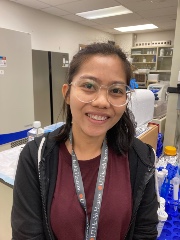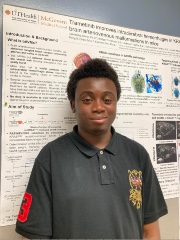Laboratory of Eunhee Kim, Ph.D.
OVERVIEW
Research in the Eunhee Kim laboratory is focused on evaluating molecular and genetic mechanisms, biomarkers, and the inflammatory response involved in stroke and brain arteriovenous malformation (bAVM). The ultimate research goal is to translate the findings into novel therapeutic strategies for the patients.
Stroke is one of the major causes of disability and death worldwide, however there are limited treatment options available for the stroke patients. Several risk factors such as hypertension, dyslipidemia, and diabetes have been involved in the higher stroke incidence and poorer outcomes, but the underlying mechanism(s) of the negative impact is not clear. By incorporating the risk factors in animal models of stroke, Dr. Kim is particularly interested in investigating how post-stroke stress response is regulated in the comorbid conditions, and how it affects stroke-induced immune response and stroke outcomes including acute injury and long-term recovery.
Another line of research is focused on understanding the pathophysiology of brain arteriovenous malformation (bAVM). The bAVM is a critical risk factor for hemorrhagic stroke in young patients however, the etiology and pathology of bAVM are largely unknown. Dr. Kim is currently investigating the role of several molecular factors related to endothelial dysfunction, angiogenesis, and inflammation in bAVM pathophysiology. By modulating the factors in vivo and in vitro, the ongoing bAVM research includes generating a clinically-relevant bAVM animal models and defining the underlying mechanisms in bAVM formation and pathology, and investigating the subsequent impact of bAVM in cerebral hemorrhage.
Dr. Eunhee Kim is an assistant Professor in Vivian L. Smith Department of Neurosurgery at UTHealth Houston. Dr. Kim received her Ph.D at Kyung Hee University in Seoul, Korea. During her Ph.D, she focused on the regulation of growth hormone axis in endocrine disorders such as acromegaly and diabetes. With the background in neuroendocrinology, she joined Dr. Cho lab at Burke Medical Research Institute for a postdoctoral training and was promoted as an instructor in Feil Family Brain and Mind Research institute at Weill Cornell Medicine in 2013. During the training and early career period, Dr. Kim acquired an extensive experience in cerebrovascular pathophysiology with a specific training in in vivo and in vitro studies on ischemic stroke. She defined the role of an inflammatory mediator, CD36 in acute stroke outcomes in hyperlipidemic and diabetic conditions and the underlying mechanisms governing the stroke with the comorbidities. She was also involved in studying the importance of synaptic plasticity for long-term functional recovery after stroke and the effect of genetics using animal model of human BDNF polymorphism. These works have been published in several journals including Annals of Neurology, Journal of Neuroscience, and Journal of Cerebral Blood Flow and Metabolism.
Current Project
- Effect of stress response on acute stroke injury and long term recovery in diabetic condition
- Role of brain endothelial KRAS mutation in bAVM formation and pathology
- Role of endothelial-to-mesenchymal transition in bAVM pathomechanism
Team Members
Current members:
 Ohnmar Myint, PhD
Ohnmar Myint, PhD
Postdoctoral Research Fellow
 Adrian E. Bafor, BS
Adrian E. Bafor, BS
Research Assistant
Former members:
- Eunsu Park, PhD, Postdoctoral Research Fellow, Instructor
- Sehee Kim, PhD, Postdoctoral Research Fellow
- Jaeyeong Jeong, PhD, Postdoctoral Research Fellow
- Samantha M. Wilfur, B.S., Research Assistant
RECENT PUBLICATIONS
- Jeong JY*, Bafor AE, Freeman BH, Chen PR, Park ES, and Kim E# (2024) Pathophysiology in brain arteriovenous malformations: Focus on endothelial dysfunctions and endothelial-to-mesenchymal transition. Biomedicines 2024, 12(8), 1795; https://doi.org/10.3390/biomedicines12081795
- Savarraj J*, McBride DW, Park E, Hinds S, Paz A, Gusdon A, Ren X, Pan S, Ahnstedt H, Delevati Colpo G, Kim E, Zhao Z, McCullough L, Choi H# (2022) Leucine-rich alpha-2-glycoprotein 1 is a systemic biomarker of early brain injury and delayed cerebral ischemia after subarachnoid hemorrhage. Neurocritical Care 2023 Jun;38(3):771-780. doi: 10.1007/s12028-022-01652-7. Epub 2022 Dec 28. PMID: 36577901 PMCID: PMC10247387
- Kim S*, Park ES, Chen PR, and Kim E# (2022) Dysregulated hypothalamic-pituitary-adrenal axis is associated with increased inflammation and worse outcomes after ischemic stroke in diabetic conditions. Frontiers in Immunology. 2022 Jun 16;13:864858. doi: 10.3389/fimmu.2022.864858. eCollection 2022 PMID: 35784349 PMCID: PMC9243263
- Park, ES*#, Kim S, Yao DC, Savarraj JPJ, Choi HA, Chen PR, and Kim E# (2022) Soluble endoglin stimulates inflammatory and angiogenic responses in microglia that are associated with endothelial dysfunction. Int J Mol Sci. 23(3), 1225. Doi: 10.3390/ijms23031225PMID: 35163148 PMCID PMC8835690
- Savarraj J*, Park ES, Copo G, Hinds S, Morales D, Ahnstedt H, Paz A, Assing A, Juneja S, Kim E, Cho SM, Gusdon A, Dash P, McCullough L, Choi HA# (2021) Brain injury, endothelial injury and inflammatory markers are elevated and express sex specific alterations after COVID-19. J Neuroinflammation.2021 Nov 27;18(1):277. doi: 10.1186/s12974-021-02323-8. PubMed PMID: 34838058 PMCID: PMC8627162.
- Park ES*, Kim S, Huang S, Yoo JY, Körbelin J, Lee TJ, Kaur B, Dash PK, Chen PR#, Kim E# (2021) Selective endothelial hyperactivation of oncogenic KRAS induces brain arteriovenous malformations in mice. Ann Neurol, 2021 May;89(5):926-941. doi: 10.1002/ana.26059. Epub 2021 Mar 22. PMID: 33675084 (Featured in Cover)
- Yeh M*, Wang YY, Yoo JY, Oh C, Otani Y, Kang JM, Park ES, Kim E, Chung S, Jeon YJ, Calin GA, Kaur B#, Zhao Z# (2021) MicroRNA-138 suppresses glioblastoma proliferation through downregulation of CD44. Sci Rep, 2021 Apr 28;11(1):9219. Doi: 10.1038/s41598-021-88615-8. PMID: 33911148 PMCID: PMC8080729
- Kim E*, Cho S# (2021), Review, CNS and peripheral immunity in cerebral ischemia: partition and interaction. Experimental Neurology, 2021 Jan;335:113508. doi: 10.1016/j.expneurol.2020.113508. Epub 2020 Oct 14. PMID: 33065078 PMCID: PMC7750306, Review
- Park KW*, Fury W, Wu Z, Kim E, Guo Y, Woo Ms, Bai Y, Macdonald LE, Croll SD, Cho S# (2020) Sustained increases in immune transcripts and immune cell trafficking during the recovery of experimental brain ischemia, 2020 Aug;51(8):2514-2525. doi: 10.1161/STROKEAHA.120.029440 Epub 2020 Jul 9. PMID: 32640942 PMCID: PMC7815290
- Yang J*, Kim E, Beltran C, Cho S# (2019) Corticosterone-mediated body weight loss is an important catabolic process for poststroke immunity and survival. 2019 Jul 26:STROKEAHA119026053. doi: 10.1161/STROKEAHA.119.026053. PMID: 31345131 PMCID: PMC6710102
- Kim E*, Yang J, Park KW, and Cho S# (2019) Preventative, but not post-stroke, inhibition of CD36 attenuates brain swelling in hyperlipidemic stroke. J Cereb Blood flow Metab. 2019 May 15:271678X19850004. doi: 10.1177/0271678X19850004. PMID: 31092085 PMCID: PMC7168788
Kim E*, Yang J, Park KW, Cho S# (2018) Inhibition of VEGF Signaling reduces diabetes-exacerbated brain swelling, but not infarct size, in large cerebral infarction in mice. Transl Stroke Res, 2018 Oct;9(5):540-548. doi: 10.1007/s12975-017-0601-z. Epub 2017 Dec 30. PMCID: PMC6057840
PubMed List of Publications Click Here